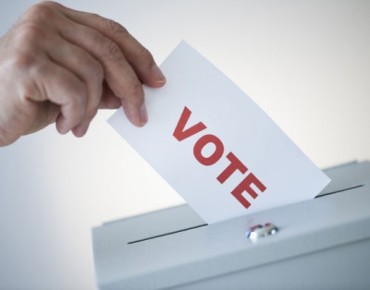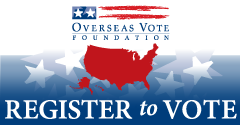Opinion: The Voting Commission and the View from Overseas

You Can Vote in Your Home Country
The Voting Commission and the View from Overseas
Susan Dzeiduszycka-Suinat
We are fresh from an election where the publicly aired voting problems, where they occurred, resulted in a shared sense of disappointment. And a strong desire to act.
The millions of Americans overseas, both civilian and military, are acutely aware, that our elections are viewed with great curiosity around the world. How could the most successful democracy in the world experience such problems with the voting process?
As an overseas voter, it’s particularly painful to watch Americans at home standing for hours in long lines to exercise their right to vote, when we know that overseas and military voters were not asked to do anything of the sort in order to cast our ballots. We must take action to correct these continuing problems at home, and we can. Electoral reform is possible in the United States. At Overseas Vote Foundation (OVF), we know, because we have lived it.

In 2009, the Military and Overseas Voter Empowerment (MOVE) Act was passed with bipartisan support in Congress. This was the first
major policy change in decades for military and overseas voters. MOVE mandated the electronic availability of voter registration applications, absentee ballot applications and blank ballots. As such, the OVF 2012 Post-Election Survey found significant increases in the use of these electronic transmission methods, specifically a 30 percent increase in the electronic delivery of blank ballots.
The 2012 survey reveals a measurable positive impact of the MOVE Act on military and overseas voter participation. More voters are receiving their ballots, and receiving them on time. Notably, only 2.5 percent of individuals reported receiving their ballot the week before Election Day or later, down from 5 percent in 2010 and 11 percent in 2008. Survey respondents who reported not receiving a ballot dropped 5 percent overall, from 22 percent in 2008 to 17.3 percent in 2013.
While reform of the overseas and military voting situation is not complete, OVF surveys of overseas voter experience provide evidence of
As our survey findings show, the MOVE Act brought real improvements to military and overseas citizen voters, as well as election officials. Importantly, the environment for military and overseas voting reform is both ripe and positive. Proven technology is more than capable of addressing mundane voting procedures. Critically, available data derived from 13,600 overseas voters – fueled discussion among 165 election stakeholders during the OVF Summit 2013 in Washington, D.C. on January 24th. a reversal among several negative trends. Thus, the military and overseas voting example is instructive for domestic policy.
The overseas voter experience and surveys demonstrate the utility of the results to fuel deliberate civil debate vital to guide and support decisions. Notably, a dialogue amongst key stakeholders was established.
In his recent State of the Union speech, President Obama announced the formation of a bipartisan voting commission on electoral reform, a declaration that has sparked both praise and skepticism. However, in response to the public display of chaos on Election Day, the view from Americans overseas is that it is crucial to publicly acknowledge the need for reform, and equally as important to call for action.
Ideas are out there, data is available, technology is at hand, and great minds stand ready to address the voting reform challenges ahead. It is the right time for the voting commission. We must start with optimism, assume leadership, and begin now.
Related Stories:



 Euro Converter
Euro Converter
Opinion: The Voting Commission and the View from Overseas
The Voting Commission and the View from Overseas
Susan Dzeiduszycka-Suinat
We are fresh from an election where the publicly aired voting problems, where they occurred, resulted in a shared sense of disappointment. And a strong desire to act.
The millions of Americans overseas, both civilian and military, are acutely aware, that our elections are viewed with great curiosity around the world. How could the most successful democracy in the world experience such problems with the voting process?
As an overseas voter, it’s particularly painful to watch Americans at home standing for hours in long lines to exercise their right to vote, when we know that overseas and military voters were not asked to do anything of the sort in order to cast our ballots. We must take action to correct these continuing problems at home, and we can. Electoral reform is possible in the United States. At Overseas Vote Foundation (OVF), we know, because we have lived it.
In 2009, the Military and Overseas Voter Empowerment (MOVE) Act was passed with bipartisan support in Congress. This was the first
major policy change in decades for military and overseas voters. MOVE mandated the electronic availability of voter registration applications, absentee ballot applications and blank ballots. As such, the OVF 2012 Post-Election Survey found significant increases in the use of these electronic transmission methods, specifically a 30 percent increase in the electronic delivery of blank ballots.
The 2012 survey reveals a measurable positive impact of the MOVE Act on military and overseas voter participation. More voters are receiving their ballots, and receiving them on time. Notably, only 2.5 percent of individuals reported receiving their ballot the week before Election Day or later, down from 5 percent in 2010 and 11 percent in 2008. Survey respondents who reported not receiving a ballot dropped 5 percent overall, from 22 percent in 2008 to 17.3 percent in 2013.
While reform of the overseas and military voting situation is not complete, OVF surveys of overseas voter experience provide evidence of
As our survey findings show, the MOVE Act brought real improvements to military and overseas citizen voters, as well as election officials. Importantly, the environment for military and overseas voting reform is both ripe and positive. Proven technology is more than capable of addressing mundane voting procedures. Critically, available data derived from 13,600 overseas voters – fueled discussion among 165 election stakeholders during the OVF Summit 2013 in Washington, D.C. on January 24th. a reversal among several negative trends. Thus, the military and overseas voting example is instructive for domestic policy.
The overseas voter experience and surveys demonstrate the utility of the results to fuel deliberate civil debate vital to guide and support decisions. Notably, a dialogue amongst key stakeholders was established.
In his recent State of the Union speech, President Obama announced the formation of a bipartisan voting commission on electoral reform, a declaration that has sparked both praise and skepticism. However, in response to the public display of chaos on Election Day, the view from Americans overseas is that it is crucial to publicly acknowledge the need for reform, and equally as important to call for action.
Ideas are out there, data is available, technology is at hand, and great minds stand ready to address the voting reform challenges ahead. It is the right time for the voting commission. We must start with optimism, assume leadership, and begin now.
Related Stories: